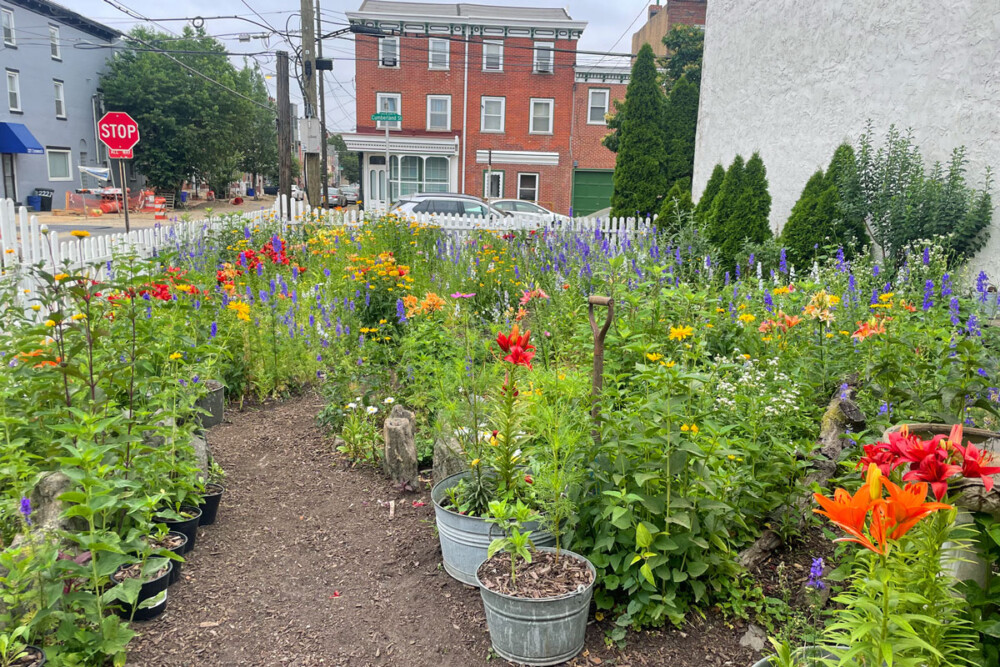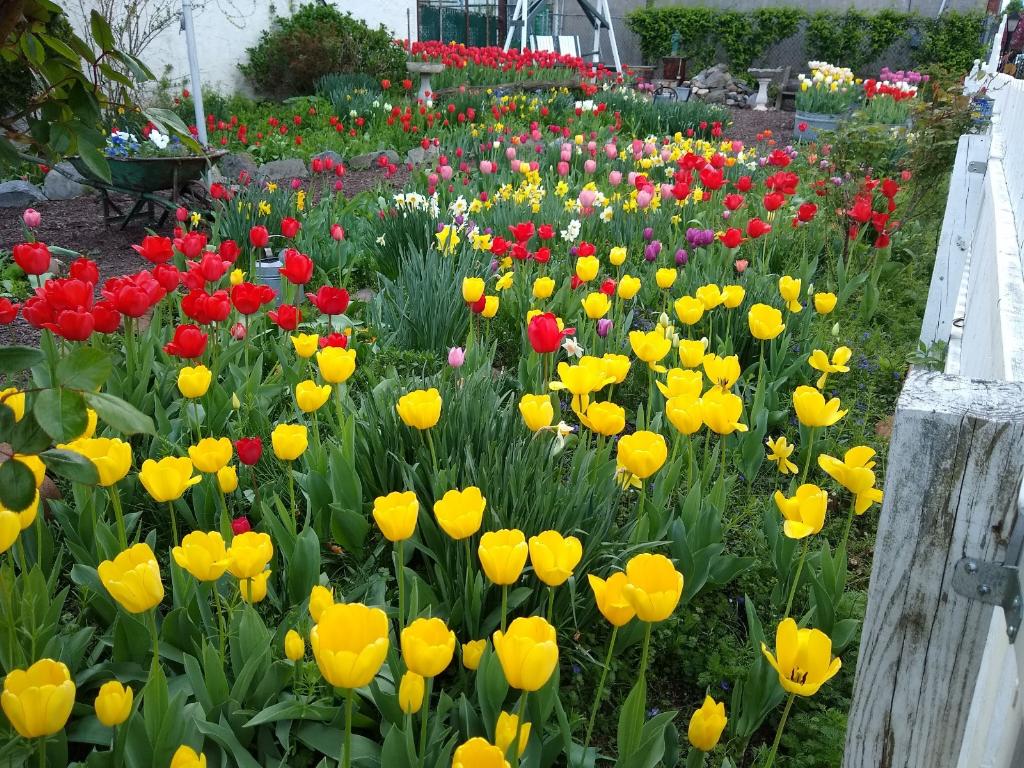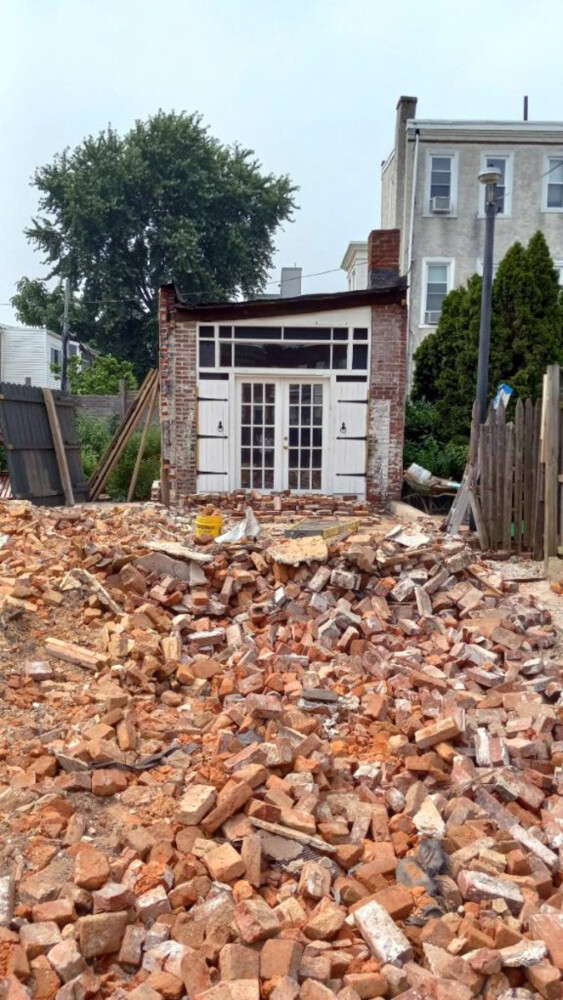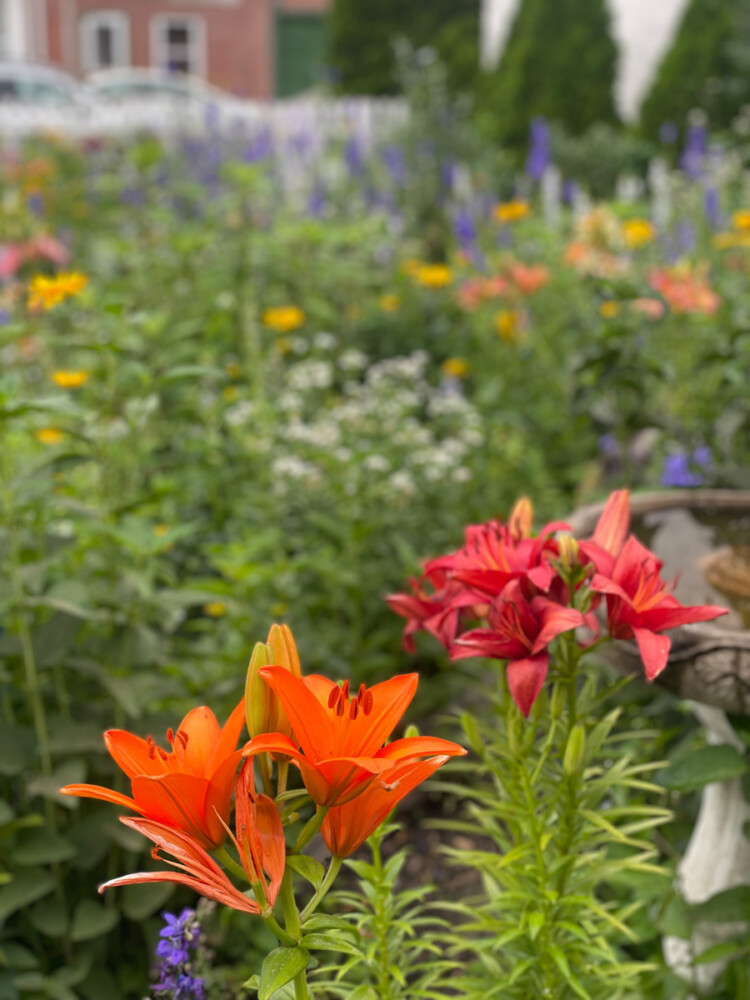
Seeds of change: How Tulip Street Garden became a neighborhood oasis & pollinator protector
Joe Caltagirone turned a vacant lot into a community landmark. Now, he’s on a mission to help pollinators like monarch butterflies.
When Joe Caltagirone bought the house he grew up in about 30 years ago in Olde Richmond, he never expected to become a neighborhood celebrity. But thanks to a gorgeous garden, he is now.
After purchasing his childhood home from his parents, Caltagirone was disappointed to see the empty lots at Tulip and East Cumberland streets were filled with trash and weeds.
At this time, there was a program which offered low prices for empty lots if you turned them into gardens. The land where the Tulip Garden now resides can never be lost to real estate development because the Neighborhood Gardens Trust (formerly Neighborhood Gardens Association) was able to acquire the two lots for permanent preservation between 1998 and 2000. Caltagirone was working full-time but went ahead and utilized the program, buying one lot at first, and then later, another.
“When I first got the land, there were a lot of people doing this, and they were all growing food, which is understandable. But there wasn’t enough land here,” he said. “I figured we needed beauty more than we needed food.”
But Caltagirone wasn’t a gardener, and so he took his inspiration from a Philly staple: the yearly Flower Show. While there, he realized that the exhibits were the same size as his empty lot.
“So what I have to do is set up a permanent Garden Show exhibit,” he remembers thinking to himself. “Because they’re really stunning.”
In true Flower Show fashion, he decided to theme the garden after a Norman Rockwell painting called Spring Flowers, which depicts a basket full of freshly picked spring flowers, and you see gardening tools as well as a woman’s hat, shoes, and gloves, and an open door. Though you can’t see the garden or the woman, you can imagine that they must both be just out of frame.

“I wanted to create the garden on the other side of that door,” explained Caltagirone.
For three decades, Caltagirone has cared for the garden, mostly using his own money. And the garden slowly grew in fame. In 2013, Caltagirone won first prize in the Community Flower Gardens category of the Pennsylvania Horticultural Society’s 2013 City Gardens Contest. Over the years, more families with baby strollers started to come through the garden, people started to make special trips to the neighborhood just to walk through, and Caltagirone says now, he can no longer be outside without someone stopping to talk to him, compliment the garden, ask a question, or say thanks.
“That’s what keeps me going. If I didn’t hear anything over the years, I would think you know what, this is not, this doesn’t matter,” said Caltagirone.
Planting Pollinator Gardens for the local ecosystem

But it’s clear from the response that his work does matter. And what he plants matters too. Caltagirone is now focusing on pollinators, insects that jump from plant to plant and carry the pollen and other things that help the plant to grow.
Why do we want to encourage insects, you might ask?
“Pollinators are absolutely critical to the world’s food supply. You know, just the same way trees are critical to air,” he said. Pollinators support the various ecosystems, including ones that clean the air, stabilize soils, protect from severe weather, and support other wildlife. Pollination is also critical to getting genetic diversity in plants, and pollinators even help ensure proper fruit and seed production for other plants, like our crops, wildflowers, or trees.
Caltagirone has hundreds of seeds and bulbs to plant next year for pollinators – and he’ll have more room to do it. He is breaking ground on yet another garden across the street. A mulch delivery was expected a few days after he talked to Green Philly, and Caltagirone already has big plans for the new space.
What would nature do?
One of those plans includes saving the monarch butterflies by planting milkweed. After discovering that the monarch is on the endangered species list, Caltagirone spent this winter and part of last year learning about pollinators and the migration of the monarch butterfly, and what people can do. Besides planting the right food, he is thinking of putting a mural up near the gardens, hoping to catch the attention of the thousands of visitors the garden sees each year.
And he encourages Philadelphians to join him, because monarchs, which are pollinators, keep our planet healthy. Monarchs pollinate many types of wildflowers, keep pests at bay, and themselves are food for birds. Milkweed is the butterflies’ sole food.

“Milkweed is very easy to grow. I didn’t have any in my garden last year and this year I have about 20 plants and I grew some from seed. And you know people think, oh, it might be hard to grow. But the only thing with this particular seed — most seeds you just put them in the ground and let them go. This particular one needs a winter or a period of cold. You buy the seeds. You put them on a napkin, you moisten the napkin, you put it in the refrigerator for two weeks. Then you take it out and just plant it — in the garden, under your lights, whatever.”
And for those Philadelphians who might be afraid they don’t have a green thumb for milkweed, flowers, or other plants, Caltagirone has a message for you.
“I was exactly that person. One day I saw a plant growing out of a building; it was on the third story and it was just growing out of this building. And nobody planted that. Nobody watered it. It blew into that little crevice on the wall three stories high. And I thought, ‘You know, nobody’s taking care of that thing.’ So the moral of the story is you give it exactly what it wants,” he said. “And if you’re ever in doubt … you should behave as if you weren’t there. Like, what would nature do?”
“I mean, I had a rock-filled yard. There’s going to be beautiful flowers there next year,” he continued. “If you have an inclination to do this, you’ll get the feeling, it’s not rocket science.”
And he isn’t stopping at pollinators or monarch butterflies. Philly Tree People, a tree-planting organization that plants about 50 trees a year, will now be headquartered at the garden as well. Anyone can volunteer to help them plant trees, and the next event is November 20.
Once, years ago, someone threw a note in a plastic bag into the garden for Caltagirone to find. The author wrote that they had passed by the garden many times, and thinks every season about how it is so beautiful. The author then wrote, “Your garden has lifted my soul many, many times.”
Caltagirone framed it.








